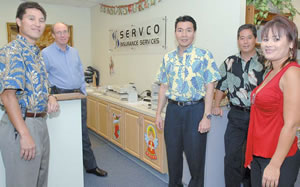The Benefit Of Good Benefits

Taking a break from the world of insurance (from left):
Malcolm Tajiri, Russ Robertson, Dean Hirahara, Bradford
Tokioka and Tracy Adams
With Christmas around the corner, many businesses are presenting their valued employees with gift certificates, food baskets and holiday cash to show their appreciation for a year of hard work. As an employee-benefits consultant, however, I work with employers to understand that the best way to show appreciation for their employees is through a comprehensive and competitive benefits package that provides for their needs year-round.
Traditional benefits like medical, dental, paid holidays and vacation time are givens for any employer in today’s marketplace. Employers need to be aware of and responsive to employees needs. More mature employees with families, for example, will have different needs than younger workers - and the benefits package must reflect that. A company with an older employee base will find that benefits like life, disability and long-term care insurance along with retirement benefits including a 401K plan, profit-sharing and medical benefits for retirees will appeal to - as well as attract- a desirable pool of employees. Flexible hours and tuition reimbursement plans are attractive to other sought-after employees. But how does a company develop an overall benefits package that brings value to a diverse employee force?
Employers often hire consultants to come up with ideas and solutions to these types of challenges. Because of limited budgets, many solutions require creativity. That’s where working collaboratively is helpful.
Russ Robertson and I jointly lead the employee benefits practice at Servco Insurance Services. We often return from strategic planning meetings with clients or prospective clients and bounce things off each other to generate different ideas and possible solutions.
We feel our ability to work together as a team for the benefit of our clients is what makes us unique. Our personalities may be different, but our commitment to our clients, and not to any one insurance company, is a distinctive competence that differentiates our approach to client engagements. As much as insurance carriers would like us to represent and sell their products, we work for the client, first and foremost. Should a client’s situation include an insurance product solution, we will help them identify and implement that solution.
Our clients expect more than the traditional placement of insurance. We bring value by engaging the client in strategic discussions about their business and what’s keeping them up at night.
Once we have an understanding of what the issues are, along with their goals and objectives, we can begin to think about ways to address the issues. The goal is to develop a comprehensive and competitive benefits program that is responsive to their employees, appropriate for their industry and company size, and cost effective for the long term. More and more prospective employees understand and consider the value of an employer’s employee benefits program.
We make sure our clients have all the necessary information to make a solid decision that is right for his or her company and employees.
Sometimes the solutions may not include the traditional insurance product offering. Non-traditional insurance product solutions might include redesigning the sick leave and vacation policies, revamping the employer vs. employee cost sharing, as well as assisting employers to comply with our local Prepaid Health Care and Temporary Disability Laws and federal laws like COBRA, ERISA and Department of Labor Annual 5500 filings.
Employers must also resist the urge to react to an influential employee or a key recruit’s request to add or enhance a specific benefit without doing a complete analysis. To be effective, a company’s employee benefits program should offer real value to the majority of the employees and complement the overall benefits package. Benefits decisions should be carefully thought out with consideration given to cost, administration, responsiveness to employees’needs, and compatibility with the client’s industry and employee benefits philosophy. Adding a new benefit program, or enhancing an existing one, needs to be carefully evaluated for the long term - because that is exactly how long a wise employer wants to keep a critical member of the company’s team.
Next Week: George Nabashima President of Seasons Quest Insurance & Financial Services
E-mail this story | Print this page | Comments (0) | Archive | RSS Comments (0) |
Most Recent Comment(s):




 Del.icio.us
Del.icio.us








